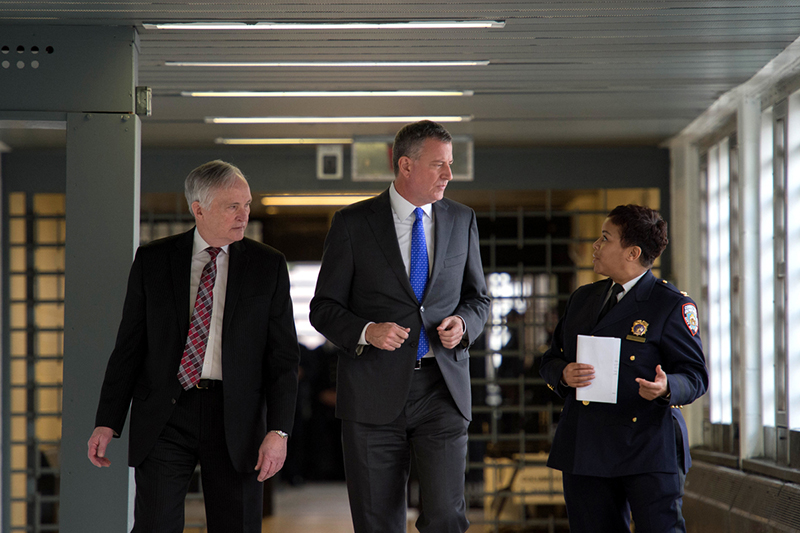
Mayor de Blasio on Rikers Island (photo: Mayor's Office)
Mayor de Blasio's announcement that the city intends to close Rikers Island jails in 10 years has met a mainly celebratory response, even from seasoned criminal justice reformers. We advise that they, after years of good work in exposing the debilitating and sometimes brutal conditions in the Rikers jails, take a deep breath and apply a critical eye.
The mayor's broad plan seems at least in part based on the recommendations of a blue-ribbon commission chaired by former New York State Chief Judge Jonathan Lippman, and will include replacing the facilities on Rikers with small jails built in different parts of the city. The Lippman Commission pegged the estimated cost at $10.6 billion, with annual cost savings then to follow. De Blasio, who has strayed away from details so far, is simply promising the outcome of closed jail complexes on Rikers and at least a couple of new jails elsewhere.
While de Blasio may see this move as good politics in an election year when he wants to shore up his liberal base, it is bad policy. Here's why:
*The 10-year goal -- far off in any context, but in politics, a lifetime -- is hardly a serious aspirational target, especially when de Blasio, even if he wins re-election, will have been out of office for years by the time Rikers would be slated for closure. The next mayor will face the large bulk of the untoward financial or bureaucratic or political consequences of the proposal.
*Any plan to close Rikers that includes the construction of new jails is a substantive mistake. Based on the recent history of municipal capital projects here in New York, we can expect that it will take longer to construct the new jails than currently thought and that it will cost even more than than the $10.6 billion projected.
*There's no reason even to be certain that conditions of confinement will improve significantly since the new facilities will operate with the same correction officers and jail culture that, in effect, contribute directly to the deplorable environment on Rikers today. Akeem Browder, the brother of Kalief Browder, whose suicide after being locked up on Rikers for three years without a trial helped spur the movement to shutter the the jails there, said: "It wasn't the walls or the conditions at Rikers that killed Kalief. It was the human beings behind the walls that abused and ultimately drove him to commit suicide."
*If city leaders choose to, they could take meaningful steps to reduce our incarcerated population even more significantly than planned, close Rikers without building new jails and house the remaining incarcerated population in the city's other existing jails.
*The most direct way of reducing the incarcerated population is by addressing the front end of the problem, namely by cutting down the number of people the city locks up in the first place for no good public safety or justice purpose. But that would mean directing the NYPD to abandon "broken windows" policing, which is the single most significant public practice factor driving the unnecessary confinement of people on Rikers, people who are not dangerous or predatory or even criminal. We know, however, that the mayor -- and his political allies -- have embraced such tactics, so there's no possibility that he'll take this critical step.
Replacing Rikers with new jails sited in different neighborhoods around the city will do next to nothing to end the abusive and discriminatory practices of our criminal justice system. The NYPD will continue to arrest and district attorneys will continue to prosecute the same people, mainly low-income New Yorkers of color, and, in effect, continue to lock up the most politically vulnerable people in our city even when all they have done is engage in innocuous activities that have been virtually decriminalized in well-off white neighborhoods.
De Blasio pulled off a similar policy flim-flam when he, along with former Police Commissioner Bill Bratton, oversaw a dramatic drop in the NYPD's use of the discredited stop-and-frisk tactic. Problem is that, under the leadership of these two men, the NYPD did not change its fundamental approach to law enforcement, namely abusive and discriminatory "broken windows" policing.
Moreover, the city could make much better use of $10.6 billion than to construct more jails. For example, research, to say nothing of common sense, tells us that small class size improves the academic outcomes for all students across racial and class lines, yet the city has no plans to promote smaller classes in our public schools, probably because of funding and space considerations.
Policymakers could also allocate the funds toward one of the Big Apple's most urgent needs, building and providing new housing that is truly affordable for our city's most low-income households. Unlike new jails, such measures would make significant progress toward improving the lives and well-being of the New Yorkers residing in the communities most often targeted by the city's policing and incarceration policies.
***
Robert Gangi is the Director of the Police Reform Organizing Project, or PROP, and a Democratic candidate for Mayor. On Twitter @PROPNYC.
***
Have an op-ed idea or submission for Gotham Gazette? Email This email address is being protected from spambots. You need JavaScript enabled to view it.